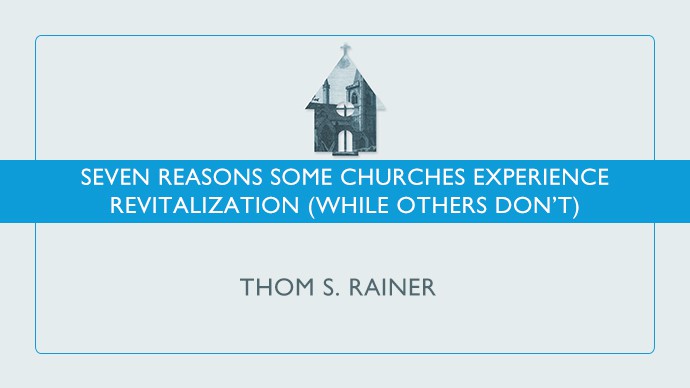
By Thom S. Rainer
I have a great love for local congregations. To be sure, I’ve never been in a perfect church. They just don’t exist.
But I still love local churches.
One of my greatest joys in the past several years has been to see and work with churches that have experienced significant turnaround. While that turnaround is typically evident in attendance numbers, it is much more than that.
I recently categorized those reasons some churches experience revitalization. I then compared them to churches that have not been revitalized. I found seven differences between the two sets of churches. These are the seven traits unique to the revitalized churches:
- The leaders and members faced reality. One of the reasons most churches don’t experience revitalization is their unwillingness to “look in the mirror.” Denial leads to decline which leads to death.
- Many in the church began explicitly praying for God to revitalize the church. I know of a leadership group in one church that prayed every week for over two years. The church is now in true revitalization.
- The churches had an explicit and clear focus on the gospel. Preaching became clearly gospel-centered. Ministries became gospel-centered. And many members began intentionally sharing the gospel, which brings me to the next reason.
- Members did not just talk evangelism; they did evangelism. I did not see a specific approach or methodology to share the gospel in these congregations. It was clear, however, that there was a more focused intentionality on sharing Christ than in many previous years.
- Many members in these churches began focusing on serving Christ through the church rather than seeking their own preferences. Another way of stating it is that these members became other-focused rather than self-focused. This attitude seemed to be directly connected to their prayers for revitalization.
- These churches raised the bar of expectations. Thus membership in these congregations became meaningful. Members moved from spectators to participants.
- The churches developed a clear process of discipleship. The members became more immersed in the Word. There was a clear and cogent plan to help members grow in their walk with Christ.
Do not count me among those who have their heads in the sand about the state of congregations in North America. As many as 100,000 churches are very sick or dying. Many more also need revitalization.
I hope you can join me for a video consultation on church revitalization at RevitalizedChurches.com. It will almost be like I’m at your church offering you guidance and hope toward the future. You can click here to sign up for the four-part overview of the series at no cost.
Yes, I remain an obnoxious optimist about local churches. I am seeing too many indicators of His work to believe otherwise. Let me hear from you. And I hope to see you in the video consultation on church revitalization.
What are your perspectives on the need for church revitalization? What do you think might be missing in many churches?











